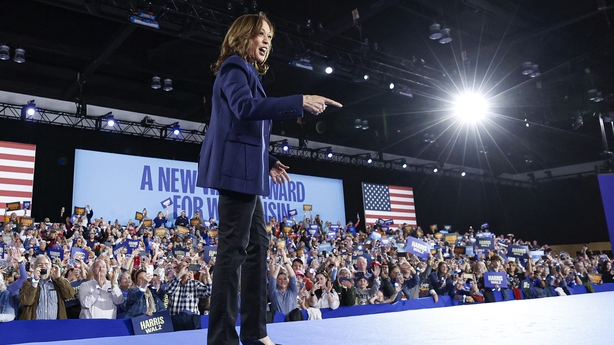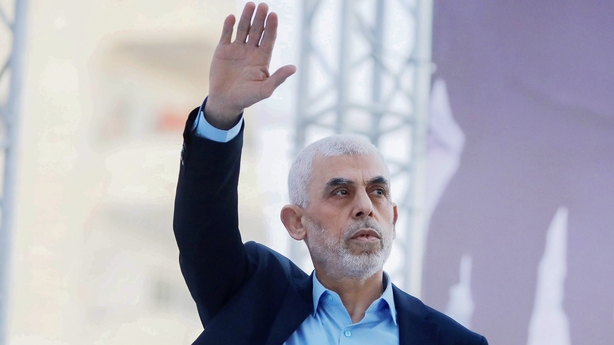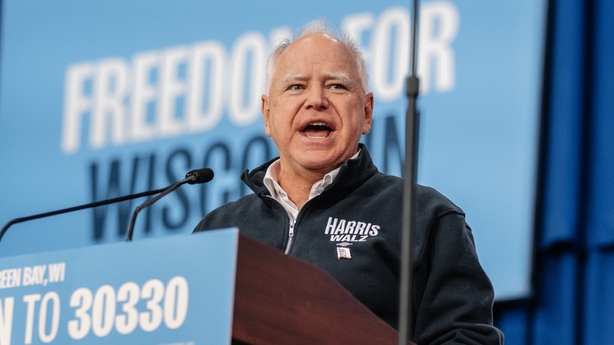Joe Biden won Wisconsin by just 22,000 votes in 2020. That's why the Republican Party staged its convention there in July, hoping the attention that comes from putting on a very big national event in a Dublin sized city might help.
The capacity at the Fiserv Centre where the RNC took place was roughly the same as the gap between the two contenders in the 2020 race. 22,000 - in a state where 3.2 million voted.
Kamala Harris was in the swing state of Wisconsin yesterday - it's her sixth visit to the state, including a rally in the same Fiserv Centre during the Democratic Party Convention in nearby Chicago.
Turnout will be the key in a contest where every vote counts in this Blue Wall State - one of the seven battlegrounds that will decide the outcome of next months presidential election.

And the vice president has her work cut out. Four years ago, in the first week in October, the polls showed Joe Biden had a five point lead over Donald Trump (private polling put the lead at 10 points). The actual outcome was a gap between them of 0.63%.
Joe Biden won 49.45%, Donald Trump 48.82%.
But at the same time in this election, a poll for Emerson College and "The Hill" political news organisation, puts Harris on 48.7% and Trump on 49.3% - a 0.6% gap in a poll with a 3.5% margin of error.
In other words, Harris ought to be much further ahead in the polls right now if she is to emulate Joe Biden's half point win in 2020. That's assuming the polls are still understating Trump support to the same extent they did in 2016 and 2020.
So what is the grit in the vice-president's wheels?
A group of pro-Palestinian protestors were outside the University of Wisconsin in Milwaukee to jeer Kamala Harris as she arrived for a campaign event. Among them Isiah Martin, angered by US support for the war, but still going to vote for Harris.
"Absolutely, I think most black men will likely, I just also feel we need to keep pressure on her for change. There has to be true systematic change at some point.
"And change at some point we, you know, talking like reparations, things like that, and then I fully believe that we can get there, but I don't know if it's going to be Kamala or somebody else.
"I don't know who it's going to be, but I’ll be damned if I vote for Trump, and the fact that there's a realistic feature where me or my people end up in slavery again, because we, I voted for that man is insane to me."
Inside, Harris delivered remarks on the death of Yahya Sinwar, the leader of Hamas, to the cameras, but refused to take any questions. It was a chance to appear presidential - that is to say tough - at a significant moment in world affairs.

Not that the people of Wisconsin appear to be much influenced by US foreign policy: That same Emerson college poll found just 0.4% said it was the most important issue facing the state in this election - 42.6% said it was the economy, 11.4% the threat to democracy, and 8.9% said reproductive right and abortion access.
But the university district is only one part of the demographic kaleidoscope that is north Milwaukee, encompassing luxury condos on the lakefront to some deeply deprived neighbourhoods inland. It's the likely decisive ground on which the electoral battle in this state will be decided.
'A very high turnout election'
At a Democratic Party campaign office in West Lisbon Avenue I got talking with Mark Ribbing, an election volunteer from St Louis, Missouri, to help out in a crucial electoral battle.
"You get the sense, not just here in Wisconsin, but elsewhere in the country, that early voting totals seem high and that there seems to be a lot of interest in people going out to make sure that their votes are banked in advance of election day, because I think a lot of people are expecting - quite reasonably - this is going to be a very high turnout election, and so I think people want to get out to make sure that their votes are registered in time."
I asked him if he had experienced any pushback from people on the doorsteps?
"You know it is a swing area, and you know you're going to run into people who support the other side, which is just obviously how democracy works."
"And on the whole, people who have said they support the other side, have been reasonably civil about it, but in the areas where we're where we are visiting, it's predominantly supportive of Ms Harris and Governor Walz.
"So far, I've been going out here in the city of Milwaukee, so obviously an urban area, it's a fairly diverse city.
"So in terms of ethnic makeup, for example, and socioeconomics, I've been visiting all kinds of different households and all kinds of different neighbourhoods and you know, we just need to get everyone out from all categories to, to go out and vote in the election."

North Milwaukee is home to the states biggest concentration of black voters. At an event run by black news channel Capital B to discuss black involvement in elections - which is well below the national average in this state - we met Malaika Jabali, a journalist writing a book on the black vote in swing state Wisconsin.
"Each swing state is going to be different. I've looked a little bit at Michigan and Pennsylvania, Florida and Georgia, some of these states where you have a significant black population, there are going to be Trump, Obama, Trump voters who, of course, they might be trying to flip to a Republican candidate.
"For a lot of black people, that's not necessarily what their calculus is. It is, have these parties actually address the needs of my community? And in a state like Wisconsin, with her, where there has been so much the industrialisation, Michigan is similar.
"Pennsylvania is also similar. Where people aren't necessarily seeing where their votes are going, then they have a little bit of scepticism about the process. But I think this year obviously, is different. You know, you've got an unprecedented type of candidate, like Barack Obama, and Wisconsin, the black voter turnout in 2012 for him was about 78%, so even if they might be feeling that parties in general aren't necessarily addressing their needs, they might come out for a historic candidate.
"It remains to be seen if that's going to happen for Kamala Harris, but judging by some of the preliminary conversations I've had with voters on the ground here, that excitement might at least get them a critical mass for Democrats to win.
I asked her about Barack Obamas intervention last week, in which he accused black men of saying they are voting for Trump or not voting for Harris because of sexism.
"I've seen a lot of black voters, black men, who are excited about Kamala Harris. If you look at the statistics, you probably have heard it elsewhere, but in exit polls, they're the strongest demographic of men."
"Black men are those who support the Democratic Party. I think they're about 78% so yes, there are going to be some, some, some differences between how black men and black women vote, you will have people who do think that Donald Trump is a better candidate for them.
"They might be thinking about small business ownership, or they just like his personality. They could be sexist. But I think that sentiment is overblown. I think that the narrative around that is overblown. If you look at a lot of the black men that I've seen who are canvassing for Kamala Harris, they're excited about it."
"So, I think that that is a blanket statement, and I think it also negates some legitimate concerns. I think that it papers over some legitimate concerns that black men and women, young and old, have about the Democratic Party as a whole."
But for Erik Ngutse, a full time official of the Republican Party in Wisconsin (the state where the party was founded by Abraham Lincoln to fight slavery), Obama’s intervention was ill-judged.
"I think for a lot of men, especially black males, they've seen kind of what's been happening to Trump, all that legal battles, getting prosecuted for this, prosecuted for that, and I think a lot of us can kind of understand how that is, given that, you know, a lot of black males do feel judged by the judicial system.
"Is that fair? I think them seeing that in Trump and seeing him be victorious, ultimately, I think that drove a lot of them to be excited. They really liked that idea.
"On the other side with kamala's track record of keeping African American men behind prison, even after there was evidence that they were not guilty, a lot of them, for those that, ones that do know that are not at all in favour of Kamala.
"We saw that Obama came out and essentially told black males they don't want to vote for Kamala to suck it up. But that was by the far the worst thing he could have said to them, because black males already feel like no one listens to them, or no one cares about what they have to do, what they think, or what they struggle with until it's election time. So I think that helped decide a lot."
But will it do anything to improve turnout in the black community?
"The turnout, unfortunately, I don't think it's going to be that great, just given that the candidate that the Democrats have put forth, and given that my community tends to vote overwhelmingly for the Democrats, I think the turnout will be lower than expected for an election like this."
But, he added: "I think you will see a higher turnout when it comes to black Republicans, or black independents."
Read more:
Latest: US election stories
Michigan: Kamala Harris has a problem and it's called Gaza
Corinne Rosen, of the Working Families Party of Milwaukee, is backing Kamala Harris in the presidential election. For her the key issue is the cost-of-living, and the inability of many working class families to get by on a single salary.
"There's people that are struggling. We know there's a lot of people that are hurting right now across the country with pocketbook issues. People are really struggling. I was at an event two days ago with Bernie Sanders, and there was a woman at that event that was talking about dental care, and she was talking about, like, the high cost of dental care and how that should be included in Medicaid for older people.
"And I think there's a lot of people that have real issues that they have today, that are not long term issues that means that they're dealing with day in and day out, and that's what we're about trying to make, make this country like a better country that supports all people."
The sharp rise in the cost-of-living - the affordability issue - is seen as an achilles heel for the Democrats in general and Kamala Harris in particular. I ask Corinne if the people she is trying to persuade to vote for Harris are telling her "yes, but I got to eat as well?"
"We're actually not hearing "but I have to eat". We're hearing, yeah, I want to and I also, I am struggling. I'm working two jobs to support my family, or sometimes I'm working three jobs to support my family and just getting by.
"And so those are real issues, and they stem from, you know, real greed that's going on in this country.
"And there's people that are saying, Look, I've been working, I show up to work every day, and I'm making minimum wage and I don't make enough to afford my rent. Like, those are real issues that we're dealing with in this country, and we want to make sure that people can, you know, work one job and afford to pay for their families.
"I talked two days ago. I was talking with family, and I was saying, like, you know, you should be able to work one job and go on a vacation with your family. That shouldn't be a luxury. You know, middle class families and working class families should be able to do those things and enjoy their lives."
In the end this race boils down to turnout, both on 5 November, and early in-person voting or mail in ballots. It will come down to who will be able to get the most voters out. Sounds simple, but this state is likely to be a nail biter on election night.
We need your consent to load this rte-player contentWe use rte-player to manage extra content that can set cookies on your device and collect data about your activity. Please review their details and accept them to load the content.Manage Preferences






